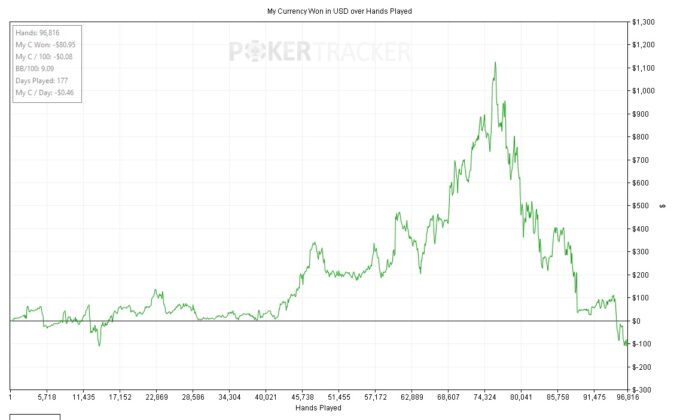What do you do when you lose your entire bankroll? It’s not a situation anyone wants to be in, but it happens – especially to newer players who may not understand the intricacies of bankroll management.
Here’s the thing about an aggressive bankroll building strategy: When you’re trying to build it as quickly as possible, it’s a self-fulfilling prophecy. If you’re doing well, and coolering people or your coin flips are working, you’re going to be building it super fast because you’re putting a lot of your money in play. But as soon as you lose one big plot, you’re done. You just keep chasing the loses. This is why it’s important to have self-control when it comes to big wins and big losses – but we’ll get to that in a bit.
The fact remains, losing your bankroll happens, so if you’re here because it’s just happened to you, take heart: here’s what you can do to regroup, recover and re-engage.
Identify Why You Lost Your Bankroll
Common reasons include only having a couple of buy-ins for the limits you were playing; moving up limits as soon as you win; and cashing out part of your bankroll without dropping limits. Sound familiar? Remember to resist urges to gamble, and make the best decision possible for each situation. All these situations arise from being exposed to too much risk for your bankroll. If you got lucky, you were going to get super lucky, and if you didn’t, you were going to bust.
Moving Forward: Strategies
Since losing your bankroll is probably going to leave you feeling pretty bereft, the first thing you want to do is take a break. At least 24 hours. This will give you time to think about what caused you to bust, and give you the opportunity to calm down so you won’t make rash, expensive and tilted decisions.
Next, identify what you want from poker. If you’re just playing some tourneys or cash games to have fun, then there’s nothing wrong with depositing a small amount and seeing if you can run it up. If you do really well, cashout, and if you don’t, you simply lose that menial deposit. If you’re comfortable losing a little cash, and you’re not sitting there wondering why (since I’ve just told you) then by all means, go for it. If, however, you want to play seriously and make money, then you want to take different approach. Making the small deposits is not how you are going to do this, long-term.
What Not to Do
That money you lost? It’s gone. Accept it. When you re-deposit, it should not be to make back those funds. Have specific goals about what you want to do (i.e. why you are playing poker in the first place!).
How to Avoid Losing Your Bankroll
This is for the serious players. Here are my tips to help you avoid losing your bankroll.
1) Deposit an amount of money you will take seriously. This will help you stay focused and serious about practicing solid bankroll management. If it is a measly amount you don’t care if you lose, it’s not going to entice you to make good decisions.
2) Don’t jump stakes if you are losing. If you do this, you’re just increasing the variance and increasing your likelihood of busting out. Again, you might win in a coin-flip, but you’re just as likely to lose.
3) Don’t try to build your bankroll as quickly as possible. It’s fun, but just not sustainable.
Good bankroll management is not losing your bankroll in the first place. If you’re reading this because you just have, this is probably the last thing you want to hear. Still, a good defense really is the best offense, and sure, sometimes you’ll get bailed out and get lucky, but sometimes you won’t. And that’s going to hurt – a lot. And the more you try to mitigate the damages by going deeper and further in, the more pain you’ll cause yourself. You have to overcome this urge to get even, because it’s OK to lose – as long as you’re making good decisions. If you can’t overcome that score-settling impulse, then you may want to think about if poker is the game for you.



